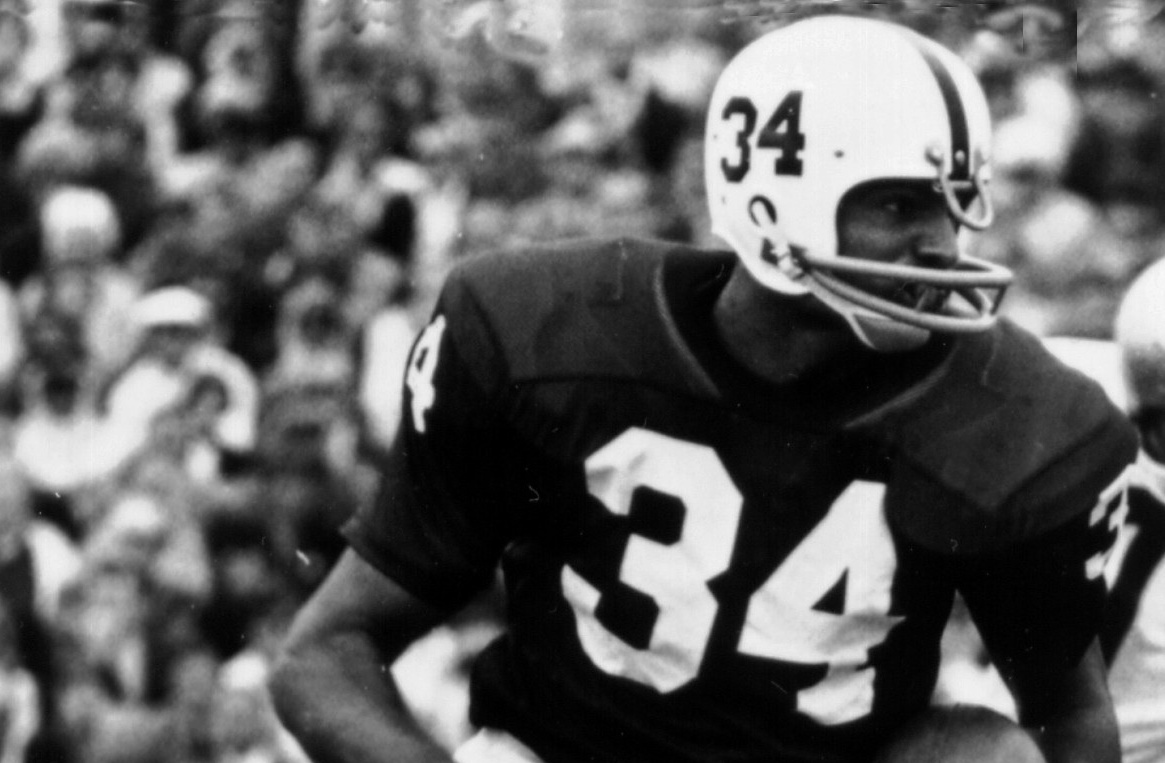
Franco Harris was a three-time letterman at Penn State from 1969-71 before embarking on a Hall of Fame NFL career. Photo courtesy Penn State.

Franco Harris was a three-time letterman at Penn State from 1969-71 before embarking on a Hall of Fame NFL career. Photo courtesy Penn State.
Every athlete dreams of a fateful moment of truth. They face fourth down and game, or a full count with two outs in the bottom of the ninth, or free throws with the game on the line.
And for the fortunate few that do face that moment, even fewer come through to win the day and win a measure of immortality that endures long after their playing days have ended.
For Franco Harris that moment came on December 23, 1972, when he grabbed a deflected pass just inches from the artificial turf in Three Rivers Stadium and made what became “The Immaculate Reception.”
In Franco Harris, the football fates raised a hero to lead a previously woeful franchise to its first playoff win. And that moment was the first cornerstone of what would become a dynastic football reign in Pittsburgh. A team once mired in mediocrity became a standard of excellence for decades to come.
Franco attained the type of iconic sports immortality where one can be identified by simply one name. And he handled it with the kind of class that endeared him to Steeler fans far and wide and even garnered him a fan section aptly named “Franco’s Italian Army.”
But often the ascension to football immortality demands a test of one’s character and resolve. Many fly too close to the sun, tumbling back to earth because of the Icarus-like hubris that often comes with sudden fame and adulation.
With Franco, there was no loss of humility. The vanity of celebrity never touched his soul.
Instead, he remained guided by steady integrity, loyalty, compassion and commitment to his core values.
Franco Harris took that gift from the football fates and used it to benefit others. In life the choices we make following both failure and success result in outcomes that define a legacy. Franco made the active choice to become a leader in society and that, above all, will remain his legacy.
In so doing he became a hero beyond the gridiron.
The great tennis champion and humanitarian Arthur Ashe once said: “True heroism is remarkably sober, very undramatic. It is not the urge to surpass all others at whatever cost, but the urge to serve others at whatever cost.”
By that very definition Franco Harris was a hero in our time. He was called to many causes, making time for everything he could. And he approached each with compassionate grace and the humility to know that service to others is when we practice our best leadership. And some of the best examples of Franco’s leadership came with a determined loyalty to what is right.
In the culture of the Native Americans there was a concept of the Dog Soldiers, the most elite of all warriors. When their families, friends and homes came under attack, these soldiers drove a stake in the ground and tied themselves to that stake. It told everyone that they would not retreat, they would not yield and they would defend their homes and their people at whatever cost.
In some of the toughest times for the Penn State community, when the tempest winds blew hardest and when the nightfall seemed darkest, Franco’s loyalty never wavered. He drove his stake in the ground and remained loyal to the people and this community when lesser people fled and ran from controversy.
We spent many days talking during that time. And in the darkest hours we came to know him and know his character even more.
My wife, Kelley, grew up in Pittsburgh during the Steelers dynasty of the 1970s. Amid a sorrowful Wednesday morning she said something to me that summed it up so well.
“You know Franco was an idol to so many when I grew up. How lucky I’ve been to get to understand that as great as we thought he was then, he is an even better person than we could have imagined.”
How lucky were we to find that the person we held in such high esteem, was in fact, even more worthy of our esteem than we thought?
Last week we interviewed Franco on our TV show, Nittany Game Week. When we asked him why he thought the Immaculate Reception remained so meaningful all these years later he replied:
“People like things that are impossible to achieve, that when things look hopeless and when things look like they’re at a loss, you still have to believe. When you have plays that make that moment, it keeps that spark burning in people. If you still have time on that clock you can still make things happen.”
But it goes deeper than that. Franco did not rest on that moment, instead he built upon that rock. In the nearly 50 years that have passed, Franco gave others hope, gave people a reason to believe in the innate goodness of humanity.
While the time on his clock may have ended, he hustled toward the goal line until the final whistle. We will all forever remember those hands reaching to make the impossible happen and his youthful stride down the sideline and the joy of miraculous victory. And in that memory, we will see that spark and hope’s fire rekindled time and time again.
Receive all the latest news and events right to your inbox.

80% of consumers turn to directories with reviews to find a local business.